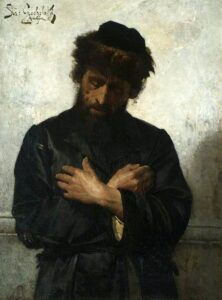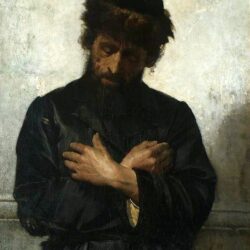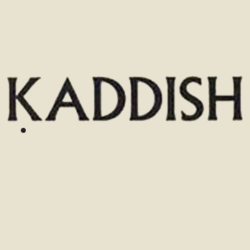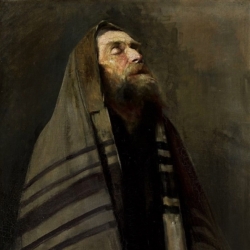This text uses the passage for the Askenazi nusach of the Modim d’Rabbanan and incorporates it into an extended version of the Modim, slightly editing it so as to fit more appropriately and so as not to repeat the word “modim” (which is forbidden on the grounds of appearing, ḥas v’shalom, to pray to multiple deities—see Berakhot 33b). It was first written for a separate project by the editor but here it can be found alone. It can be silently recited when praying alone or after a heykhe kedusha, to replace the first paragraph of the Modim prayer.
This is part two in a series of replacements when praying alone for the Askhenazi rite that the editor is submitting.
| Source (Hebrew) | Translation (English) |
|---|---|
מוֹדִים אֲנַֽחְנוּ לָךְ שָׁאַתָּה הוּא יהוה אֱלֹהֵֽינוּ וֵאלֹהֵי אֲבוֹתֵֽינוּ לְעוֹלָם וָעֶד׃ צוּר חַיֵּֽינוּ מָגֵן יִשְׁעֵֽנוּ אַתָּה הוּא׃ לְדוֹר וָדוֹר נוֹדֶה לְךָ וּנְסַפֵּר תְּהִלָּתֶֽךָ עַל חַיֵּֽינוּ הַמְּסוּרִים בְּיָדֶֽךָ וְעַל נִשְׁמוֹתֵֽינוּ הַפְּקֻדּוֹת לָךְ וְעַל נִסֶּֽיךָ שֶׁבְּכׇל־יוֹם עִמָּֽנוּ וְעַל נִפְלְאוֹתֶֽיךָ וְטוֹבוֹתֶֽיךָ שֶׁבְּכׇל־עֵת עֶֽרֶב וָבֹֽקֶר וְצׇהֳרָֽיִם׃ |
We give thanks to You for You are Adonai our God and God of our ancestors forever and ever. Rock of our life, Shield of our rescue are You. From generation to generation we thank You and recount Your praises for our lives dedicated in Your hand, and for our souls assigned to You, and for Your miracles which are with us every day, and for Your wonders and goodnesses at all times, evening and morning and afternoon. |
אַתָּה הוּא אֵל הַהוֹדָאוֹת אֱלֹהֵי כׇל־בָּשָׂר יוֹצְרֵֽנוּ וְיוֹצֵר בְּרֵאשִׁית׃ בְּרָכוֹת וְהוֹדָאוֹת לְשִׁמְךָ הַגָּדוֹל וְהַקָּדוֹשׁ עַל שֶׁהֶחֱיִיתָֽנוּ וְקִיַּמְתָּֽנוּ׃ כֵּן תְּחַיֵּֽנוּ וּתְקַיְּמֵֽנוּ וְתֶאֱסֹף גָּלֻיּוֹתֵֽינוּ לְחַצְרוֹת קׇדְשֶֽׁךָ לִשְׁמוֹר חֻקֶּֽיךָ וְלַעֲשׂוֹת רְצוֹנֶֽךָ וּלְעָבְדְּךָ בְּלֵבָב שָׁלֵם כִּי עָלֵֽינוּ לְהוֹדוֹת לָךְ׃ |
You are the God of Thanksgiving, God of all flesh, our Maker and Maker of creation. Blessings and thanksgivings to Your great and holy name, for You gave us life and sustained us. Thus may you give us life and sustain us and gather our exiles to Your holy courtyards to guard Your laws and do Your will and serve You wholeheartedly, that it is upon us to give thanks to You. |
הַטּוֹב כִּי לֹא כָלוּ רַחֲמֶֽיךָ וְהַמְרַחֵם כִּי לֹא תַֽמּוּ חֲסָדֶֽיךָ מֵעוֹלָם קִוִּֽינוּ לָךְ׃ |
The Good One, whose mercies never end, the Merciful One, whose kindness never runs out, eternally we hope in You. |
The Modim d’Rabbanan is unique among the devarim she-bi-kdusha because it is never recited out loud. It is traditionally read by the community as the prayer leader recites the standard text of the Modim, as discussed in Sotah 40a:

“מודים דרבנן בלי מנין או אם לבד (אשכנז) | Modim d’Rabbanan Replacement for when Praying Alone or Without a Minyan (Nusaḥ Ashkenaz), by Isaac Gantwerk Mayer” is shared through the Open Siddur Project with a Creative Commons Attribution-ShareAlike 4.0 International copyleft license.






Leave a Reply